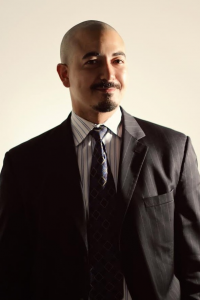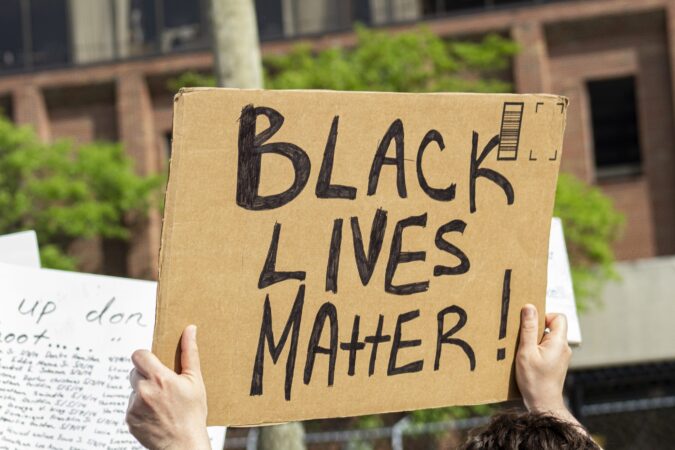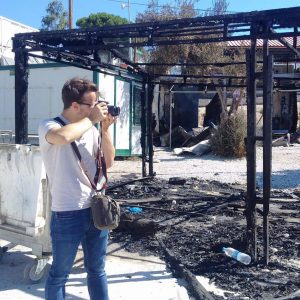New Detroit is a racial justice organization made up of leaders from civil rights & advocacy organizations, human services, health & community organizations, business, labor, foundations, education, and media throughout Metro Detroit. Formed in response to the 1967 uprising, the goal of New Detroit is to achieve racial understanding and racial equity within the region while serving as a catalyst for change by influencing the actions of individuals and institutions.

MICHAEL S. RAFFERTY, PRESIDENT AND CEO OF NEW DETROIT
Michael Rafferty, who has served as President and CEO of the organization for a little over a year now, was born and raised in Northwest Detroit and has a history of working with economic development, community development, and nonprofit management in the city. Working with the Detroit Economic Growth Corporation before coming into his current role, Rafferty saw the ongoing cultural struggles around the topic of race in Detroit.
With all that has happened in the first half of 2020, Rafferty shared with us about the recent demonstrations against police violence, the COVID-19 Pandemic, as well as the deep history of racial injustice in America.
HOW DOES A CITY LIKE DETROIT GO ABOUT ADDRESSING ISSUES SUCH AS POLICE BRUTALITY AND RACISM?
Have you ever heard somebody who’s got an advanced stage of cancer? There’s treatment involved, but it’s complicated because it’s metastasized, and one of the ways to think about somebody who’s got cancer that’s all over their body is it’s now systemic. So when we say systemic racism, one of the things that we mean is it’s everywhere. If you have an infestation of something in your house like ants or whatever the case is, you know you can’t just kill one and expect it to be over, you have to basically overhaul everything.
When you’re applying that to this scenario, you know racism exists in basically four different categories. It exists, personally, so, somebody wakes up in the morning and they’re by themselves, there is racism in that room right because that person has beliefs, opinions, thoughts. It doesn’t necessarily get outside of that until they pick up a phone or if it gets outside their thoughts. That’s when it starts to move into the next phase, which is interpersonal where you have engagements that end up, displaying racism or displaying bias. That’s when you start to have poor behavior, people feeling bad and gaslighting and all this other stuff.
Then you go out to the institutional racism, where a person has influence and authority over an organization. When a business would hire a bartender, that bartender actually had influence over the institutional perspective. That institution now had racism programmed into it because the bartender was a representative of the business and you could now have racism expressed through the function of that place. So you have a multitude of institutions coming together, many of whom have some infusion of racism in the DNA of the establishment. That’s when you end up having these systemic issues and a lot of the stuff that we’re living with right now has a historical context.
It was important for me to use the cancer analogy because the question is a good one, but it’s a complicated response. What does a city do in this case? I mean, if you’re a doctor and you have a patient who has stage four metastatic lung cancer, brain cancer, whatever the case is you, you apply every possible tool and technique, every possible resource that you have toward remediation.
LOOKING AT OUR HISTORY, DO YOU THINK WE’VE DONE ENOUGH THROUGHOUT OUR HISTORY SINCE, SAY THE CIVIL WAR, TO ADDRESS THESE CONCERNS?
No, we haven’t done enough. Going back in history, number one, there was widescale disapproval of emancipation. There were particular people who had slaves who did not want to give them up even though it was now federal law; you couldn’t own slaves. There was just a lag in time before slave owners actually let their slaves go. We know that Juneteenth is the celebrated day that everyone knows and way too much time had passed.
A lot of these slave owners were even compensated by the federal government for the loss of “property” because that was part of the condition. The federal government basically said, “Okay, we get it, we are declaring slaves free and declaring slavery illegal. I understand that you paid for these people, and you believe their property, so okay, fine, we’ll compensate you,” and they did!
Part of that package and part of the post-emancipation process or plan rather was, as we know, to provide 40 acres and mule to freed slaves, and again, not every slave got that not every person who was freed got their 40 acres and a mule, that’s one thing. Another thing that was understood by the federal government at the time was there needs to be an integration process, an orientation process for people who were raised on plantations. Not just actual literacy but financial literacy.
There was a plan to start a whole process of creating financial literacy among freed slaves. Then Lincoln was killed and then the federal government that almost immediately followed his assassination did away with a lot of the planning that was going to toward integrating freed slaves into modern society. So that sort of integration process never really happened.
I mean yes there was some investment, some, I would say modest investment in schools. But even to this day, you see that the schools that have predominately black students, they get $2300 less per student per year on average than the average white district. Now one might say, “Oh, that’s because of taxes,” but when you look at areas where we have concentrated white poverty, the difference in the amount that that district is given per head is only about $130 less.
These biases that end up existing in the heads of people play out in policy and institution, the sort of institutional development management that has the same sort of effects that we’ve had on institutions dating all the way back to the time when we were slaves.
These biases that end up existing in the heads of people play out in policy and institutional development management. You have the same sort of effects that we’ve had on institutions dating all the way back to the time when there were slaves. The concept of keeping people separate is, approving of the separation, and investing in the separation, building the laws and the institutions around that desire for separation. That’s got to end; this is just that simple.
So yes, there are a lot of things that we should have been doing since the beginning. I think there was a movement toward abolition and folks who moved us toward emancipation did have the right questions in mind, and I believe a lot of the right planning had been done. But, the political well changes the minute the people do, which is why I say we have to focus on the person and interpersonal as well.
You can’t just work on the institutional and systemic. It’s got to be a full-court press with all elements of the issue.
SHIFTING THE TOPIC TO COVID-19, CAN YOU EXPLAIN WHY THE VIRUS WAS DISPROPORTIONATLY AFFECTING AFRICAN AMERICANS AND MINORITIES?
So, back in late February and early March, when we were learning about COVID-19 coming, the very first time I heard someone say that people who have pre-existing health conditions were going to exacerbate the conditions are the symptoms of COVID-19 and that it might exacerbate mortality, I got scared.
Personally, I know a number of people with diabetes and heart disease and asthma. I know that my community has a disproportionate level of those pre-existing conditions.
The root of it is doctors are doctors, nurses, health care professionals, people who run health care institutions, their people, and racism lives in the minds of people. If you’re a healthcare professional you might be programmed yourself to do no harm you might be programmed to live by this by this code, but your bias is still there.
So when you have a patient come in your treatment, your diagnosis of that patient may be different. If this happens over the course of a person’s life, they may live in places where you end up having systemic racism affect their health, whether it’s, a home where there’s a higher rate of lead poisoning than in a home someone else grew up in or the water like in Flint.
What does that do it changes the person’s health? The person then has a tremendous amount of personal stressors in their life. Driving while black is not an easy thing. You know the minute you have a cracked windshield, like all of us might at some point, and you’re driving someplace and you see a police officer and you think about everything your parents have told you everything you’ve heard from your friends and everything that you might have experienced, your heart rate goes up. Imagine having that happen all the time.
There was a New York Times article that showed this is just months ago, maybe six months ago, that the average black teenager experiences racism on average five times a day. Overt and explicit racism. What does that do for you? It actually over time it erodes the quality of your health, the same way that a raindrop might smooth stone over time if repetitive enough.
We live in more stressful conditions because, in part because of racism, that leads to a change in your quality of health. Put all these things into the same bucket mix them up and think diabetes is higher in the black community, heart disease higher the black community, asthma rates are higher, now COVID-19 comes and underlying conditions such as those things, exacerbate the condition itself or the disease itself, and creates greater mortality, for people who get it.
The moment I heard that, I thought my community is sitting on the beach and the tsunami is coming in right now.
GIVEN THE DIVERSITY AND TURNOUT OF THE RECENT PROTESTS AGAINST POLICE VIOLENCE, WOULD YOU SAY SOME OF THE CULTURAL ISSUES IN THE US ARE BEGINNING TO HEAL?
I hope so, I really do.
I think the only way that it can work is if there’s a multicultural effort to end racism. Abolitionism wouldn’t have happened; emancipation wouldn’t have happened if it wasn’t abolitionists If it wasn’t for Abraham Lincoln if it wasn’t for white people actually changing the policies. The Civil Rights era wouldn’t have happened, and we wouldn’t have had Equity in federal law if it wasn’t for these movements toward equity in federal law and people who were white focused on civil rights. I feel like we have to if we’re going to move toward anti-racism.
It’s can’t just be black activists who are leading the charge; racism doesn’t end with our experience it ends, it doesn’t end with the black experience, it ends with a universal transformation everybody’s everybody has to be part of this.
I think the next step beyond the protesting no because the protests are just illustrations. We have to have activity, like actual institutional, systemic change. And I think that’s where the education of what to do and how to do it how to change these problems like we know that voting is one of those things that we have to do we have to choose leadership that actually is progressive toward humanity progressive toward a better society is a progressive toward, these ideas that we all have life liberty the pursuit of happiness, we have to progress toward that.
But, so there’s a lot of stuff beyond voting that leads to anti-racism. If you have any free time on your hands there’s a book that I suggest you pick up if you haven’t already, it’s called “How To Be An Anti-Racist” by Ibram X. Kendi and it’s good.
So the multicultural protests, I think, are, are hopeful. I believe beyond the display of that hope; it’s really important to do the learning.
HOW DOES SOMEONE LEARN TO BECOME A BETTER ALLY?
It’s a journey, it really is a journey. It’s like how do you become a good spouse? You know, it starts off with a commitment. Right, being a good spouse starts off by making the commitment standing at the altar. That’s all you do, you commit. Then there’s the journey; there’s the constant follow-up there’s a constant follow-through, there’s the constant learning.
If anybody said anything about your partner, you would defend your partner. That’s an ally. If anybody started to hurt your partner, you would defend your partner. That’s an ally.
It’s important for there to be Truth and Reconciliation; the words “I’m sorry” are powerful. They’re meaningful; they’re part of our civil society, and in order for you to really meaningfully apologize for something, you have to really understand what the other side’s going through. And, I’ll be honest, not everyone over the last hundred 500-400 years. as we go back to the Atlantic slave trade, not everyone has had the same truth about the black experience, about racism. So I think there’s there’s, there’s some of that too, but I think the first parts of being an ally is making a commitment and continuous learning and continuous improvement and continuous partnership.






















